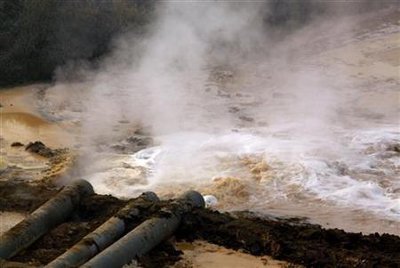| Reuters |
| March 13, 2012 |
| Brussels |
 |
|
| Pipes coming from a rare earth smelting plant spew polluted water into a vast tailings dam near Xinguang Village, located on the outskirts of the city of Baotou in China’s Inner Mongolia Autonomous Region in this file photo of October 31, 2010. The EU, US and Japan on Tuesday launched a rare earth WTO case against China. – Reuters pic |
BRUSSELS, March 13 – The European Union, United States and Japan formally asked the World Trade Organisation today to settle a dispute with China over Beijing’s restriction on exports of raw materials, including rare earth elements critical to major industries.
The EU’s trade chief, Karel De Gucht, said the three trading powers were making the dispute settlement request, the first step before filing a full trade case, following a successful EU challenge at the WTO on similar restrictions earlier this year.
“China’s restrictions on rare earths and other products violate international trade rules and must be removed,” De Gucht said. “These measures hurt our producers and consumers in the EU and across the world, including manufacturers of pioneering hi-tech and ‘green’ business applications.”
China accounts for about 97 per cent of the world’s output of the 17 rare earth metals, which are crucial for global electronics production and the defence and renewable-energy industries. They are also used in a wide range of consumer products, from mobile phones to electric cars.
The dispute is one of several between Beijing and the world’s other three largest economic powers, as China’s rise changes the world economic order. It is the first case to be jointly filed by the EU, United States and Japan with the WTO, an EU official said.
De Gucht said during a recent visit to Hong Kong that China needed to be sensitive to perceptions that its huge economy is a threat in Europe. The cost to EU businesses of China’s export restrictions runs into the billions of euros, officials say.
Trade between the EU and China has boomed in recent years, reaching almost €400 billion (RM1.59 trillion) in 2010, but EU complaints against Chinese dumping range from the shoe industry to steel fasteners. De Gucht has in the past complained that China subsidises “nearly everything”, making it hard to compete.
An EU decision to make all airlines using EU airports pay for carbon emissions has brought threats of retaliation from China, as well as from the United States and Russia.
Critics complain it is a tax, which infringes sovereignty. The EU says it is not a tax because it is based on buying and selling allowances on a market and airlines can avoid costs by finding other ways to offset their emissions.
Japan has been worried about supply of rare earths, especially after fears that China held back shipments of rare earths as punishment after the territorial dispute last year.
US President Barack Obama is currently toughening his stance on China trade ahead of November’s presidential election. He recently created a new interagency trade enforcement centre, which is expected to be up and running in the coming months and whose primary focus is to make sure China honours WTO rules.
Obama administration officials also have been considering a WTO complaint against anti-dumping and countervailing duties that China imposed late last year on US motor vehicle exports.
Beijing’s restrictions on exports of the valuable minerals became a flash point in 2010, when China halted rare earth shipments to Japan during a diplomatic dispute.
The United States and the EU have long been expected to file a WTO case against China’s rare earth mineral export curbs, but appeared to be awaiting the outcome of a separate case against Beijing’s exports on a long list of other raw materials.
That dispute was finally decided in favour of the United States, EU and Mexico in January after China lost an appeal to keep its raw material export curbs. Beijing has not yet announced how it intends to comply with the January ruling. – Reuters







